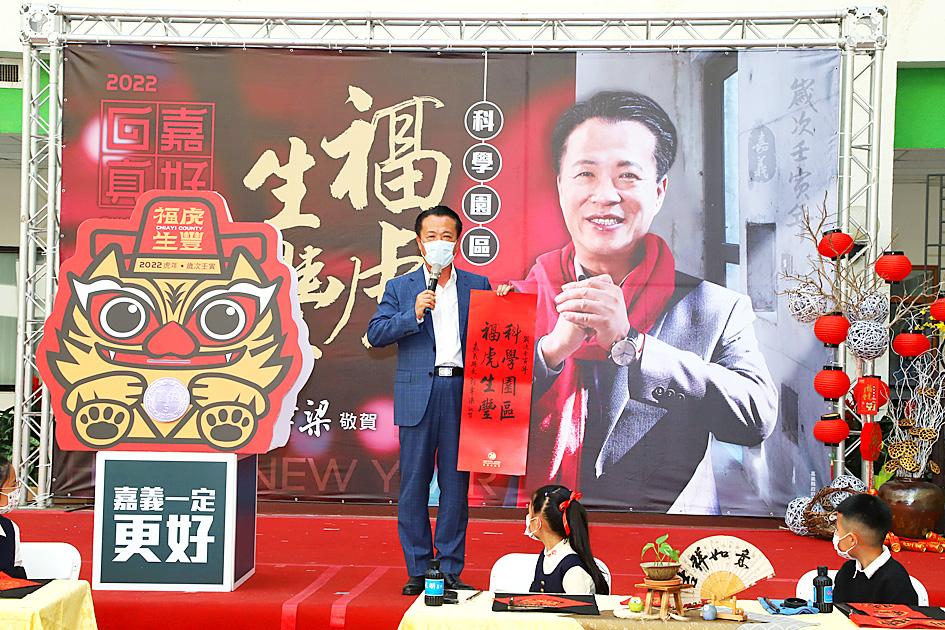Chiayi County Commissioner Weng Chang-liang (翁章梁) on Tuesday urged Taiwan Semiconductor Manufacturing Co (TSMC, 台積電) to choose his county after local media reported that it is the chipmaker’s preferred location to build an advanced IC packaging and testing plant.
The DigiTimes reported earlier in the day that TSMC was deciding whether to build the plant in Chiayi County or Yunlin County, with Weng’s county the more likely choice.
Weng said that he is delighted that TSMC is evaluating the possibility of building a plant in Chiayi.

Photo courtesy of the Chiayi County Government
The county government would do its best to help TSMC solve administrative problems arising from an investment project in Chiayi, he said.
Early this month, Premier Su Tseng-chang (蘇貞昌) approved a plan to allocate NT$8.5 billion (US$306.36 million) to set up a Chiayi science park in an 88 hectare site in Taibao City (太保) that was previously occupied by Taiwan Sugar Co (台糖).
Chiayi has a lot of land that is suitable for high-tech firms and good access to transportation systems, Weng said, adding that many firms have poured funds into the county, as they recognize its great growth potential.
With industrial parks in the county’s Machouhou (馬稠後), Shuishang (水上) and Chungpu (中埔) townships, and an aviation industrial park in Minhsiung Township (民雄), Chiayi has joined the growing list of tech areas in Taiwan, he said.
The Digitimes report cited industrial sources as saying that because TSMC’s customers have placed large orders for high-end IC packaging and testing services, the chipmaker is to build a new plant to meet the demand.
TSMC declined to comment on the Digitimes report.
TSMC operates four advanced IC packaging and testing plants — in Taoyuan, Hsinchu City, Taichung and Tainan.
The company is building a fifth IC packaging and testing plant in Miaoli County’s Jhunan Township (竹南), with phase one of the project to focus on 2.5D chip and system-on-IC technologies scheduled to start mass production this year.
Arisa Liu (劉佩真), an economist with the Taiwan Institute of Economic Research (台灣經濟研究院), said that the chipmaker aims to provide one-stop shopping services for customers from upstream pure-wafer foundry operations through backend IC packaging and testing.
This strategy is expected to help TSMC win more orders, in particular from major customers at a time when the chipmaker is aggressively expanding production capacity and upgrading technologies to cement its lead over competitors, Liu said.
TSMC had planned US$100 billion in capital expenditure from last year to next year.
Its spending was about US$30 billion last year, and it is to rise to US$40 billion to US$44 billion this year, it said last week.
Overseas, TSMC is building a wafer plant in Arizona using its 5-nanometer process technology, while it is expanding production of its mature 28-nanometer process in Nanjing, China.
The firm has also announced plans to team up with Sony Group Corp to build a wafer fab in Japan featuring the 22-nanometer and 28-nanometer processes.

Three experts in the high technology industry have said that US President Donald Trump’s pledge to impose higher tariffs on Taiwanese semiconductors is part of an effort to force Taiwan Semiconductor Manufacturing Co (TSMC, 台積電) to the negotiating table. In a speech to Republicans on Jan. 27, Trump said he intends to impose tariffs on Taiwan to bring chip production to the US. “The incentive is going to be they’re not going to want to pay a 25, 50 or even a 100 percent tax,” he said. Darson Chiu (邱達生), an economics professor at Taichung-based Tunghai University and director-general of

Hon Hai Precision Industry Co (鴻海精密) is reportedly making another pass at Nissan Motor Co, as the Japanese automaker's tie-up with Honda Motor Co falls apart. Nissan shares rose as much as 6 percent after Taiwan’s Central News Agency reported that Hon Hai chairman Young Liu (劉揚偉) instructed former Nissan executive Jun Seki to connect with French carmaker Renault SA, which holds about 36 percent of Nissan’s stock. Hon Hai, the Taiwanese iPhone-maker also known as Foxconn Technology Group (富士康科技集團), was exploring an investment or buyout of Nissan last year, but backed off in December after the Japanese carmaker penned a deal

SUPPORT: The government said it would help firms deal with supply disruptions, after Trump signed orders imposing tariffs of 25 percent on imports from Canada and Mexico The government pledged to help companies with operations in Mexico, such as iPhone assembler Hon Hai Precision Industry Co (鴻海精密), also known as Foxconn Technology Group (富士康科技集團), shift production lines and investment if needed to deal with higher US tariffs. The Ministry of Economic Affairs yesterday announced measures to help local firms cope with the US tariff increases on Canada, Mexico, China and other potential areas. The ministry said that it would establish an investment and trade service center in the US to help Taiwanese firms assess the investment environment in different US states, plan supply chain relocation strategies and

WASHINGTON POLICY: Tariffs of 10 percent or more and other new costs are tipped to hit shipments of small parcels, cutting export growth by 1.3 percentage points The decision by US President Donald Trump to ban Chinese companies from using a US tariff loophole would hit tens of billions of dollars of trade and reduce China’s economic growth this year, according to new estimates by economists at Nomura Holdings Inc. According to Nomura’s estimates, last year companies such as Shein (希音) and PDD Holdings Inc’s (拼多多控股) Temu shipped US$46 billion of small parcels to the US to take advantage of the rule that allows items with a declared value under US$800 to enter the US tariff-free. Tariffs of 10 percent or more and other new costs would slash such